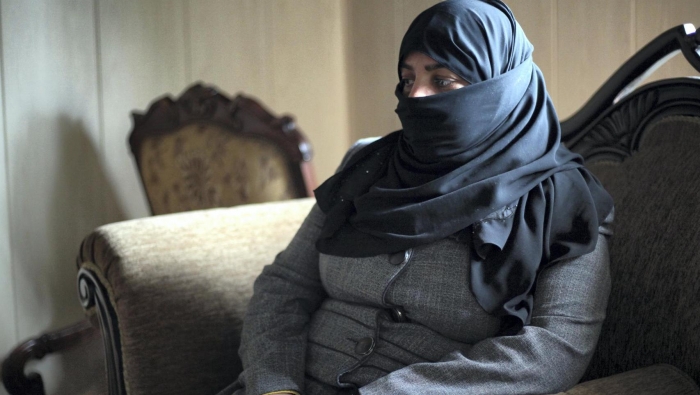Baladi - Monitors
Sara was raped by an unknown militia fighter in front of her young daughter while fleeing conflict in Syria, and again by a man who offered her help after she sought refuge in Lebanon. Unable to tell her husband for fear of rejection, she is trying to work through her trauma with the help of a psychotherapist and focus on building a safer future for her children. Leila Molana-Allen / The National
Sara’s story is so harrowing, and the potential risks to her so high, that we meet her in a nondescript home in an undisclosed location in Lebanon’s Bekaa Valley.
In her past life, now so far away, the 35-year-old owned a clothes and perfume shop in Homs, Syria’s third city.
“Life was so lovely before. I had children, my four children. I was so happy: I had a house, and my children used to go to school and come back,” Sara recounts, sitting next to a brasier and dark wood furniture in the stark apartment. “I was so happy. I was surrounded by my family.”
But when conflict gripped the city in 2011, the children’s journeys to and from school were replaced by cowering under their mother’s bed or beside the wardrobe to protect them from mortar blasts.
The family moved to the city centre, which was the theatre of brutal clashes between government troops and opposition fighters in the early years of the Syrian war, which entered its eighth year this March.
One morning, Sara says, a group of tall, muscular men carrying weapons entered a warehouse where she and a group of around 20 other women were sheltering with their children.
One of the men raped her in front of her daughter.
“I felt like I was going to die. I felt like I wanted to die and I was telling him to kill me,” she remembers.
“My daughter was telling me to take my clothes off so they wouldn’t kill us. I couldn’t take my clothes off, but my daughter was begging me, ‘Please mama, take off your clothes or they’ll kill us and my brothers and sisters.’ And that’s why they raped me. That’s what happened.”
Sara believes around half of the women in the warehouse were raped, with the attackers touching those they suspected of being virgins before assaulting them further. To this day, she does not know the attackers’ identities or political affiliation.
The rape was not the end of Sara’s ordeal. Gunmen shot her oldest son, 11-year-old Marwan, dead during the clashes, but the family was forced to flee before they could bury him.
“We were running, I couldn’t stop to go back to my son, I couldn’t go back to him, because all our lives were in danger. I left my son dead on the ground and I ran.”
Sara has never told her husband about the rape, for fear that he will abandon her, or worse.
“We face cultural issues: If I tell him [what happened], my husband will say I am a shamed woman. He will tell me it’s correct [halal] to kill me.”
Her fear of shame is widely shared among Syria’s rape survivors, some of whom have committed suicide as a result of their ordeals.
Abaad, a women’s rights organisation founded in Lebanon in 2011, uses individual case management, counselling and training for professionals to help Syrian rape survivors overcome feelings of shame and depression.
“Needs vary from survivor to survivor and we base our approach around them”, Abaad senior GBV case management supervisor Zeinab Mortada tells The National. “Confidentiality is the basis of our work with them because the women really fear their communities finding out.”
When Sara fled across the border to Lebanon, where she now lives with her husband and three surviving children, she was raped a second time by a Lebanese man. The man tricked her husband into leaving the couple’s home, before coming to rape her.
“[Afterwards] when he was leaving the house, he spat on me and said, ‘All of you Syrians are like this. You’re cheap.’”
Sara’s ordeal of multiple attacks is not unique, either.
Nour escaped a sexually abusive relationship in Syria only to be tricked into sexual assault by her employer in Lebanon. When she fought back against her attacker, she was accused of selling her body for money. Now she is working in the community to educate other vulnerable women and girls about their rights. Leila Molana-Allen / The National
Nour, a mother of four from a Damascus suburb, was beaten and raped by her husband in Syria, whom she says ran away when the war began. When she later fled to Lebanon, she was attacked while working as a seamstress, only fending off the assailant with a pair of scissors.
“This was the most difficult day I’ve been through in my life: in Lebanon, a strange person putting their hands on me and trying to rape me”, she describes. “This situation took me back to very dark periods of my life. I was being abused, and I came to another abuse that I don’t know anything about.”
Despite their compounded experiences, Syrian rape survivors in Syria and refugee-hosting countries often lack support. Meanwhile, the UN warns that the risk of sexual violence is only likely to increase as the conflict wears on.
Source: The Syrian Observatory for Human Rights

